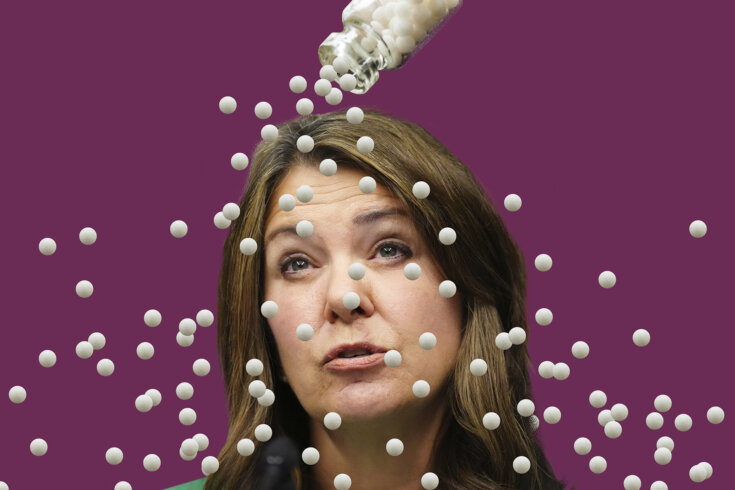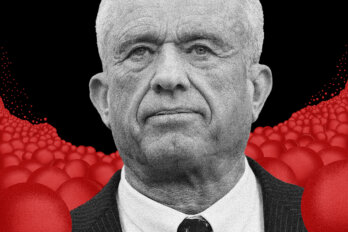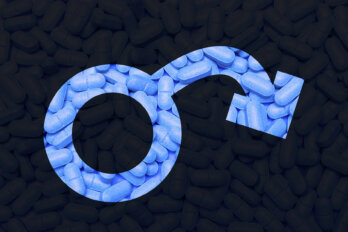A t a recent public forum in Red Deer, Alberta, Premier Danielle Smith fielded questions about everything from the degree to which the World Economic Forum controls Alberta politicians to an alleged Alberta Health Service “pedophilia problem.” She answered most of these conspiracy theory–tinged inquiries with a vague “I hear you” kind of confirmation, seeming to both agree with and validate the asker’s concerns but avoiding a concrete affirmation.
At the event, Smith was also asked whether Alberta would provide funding for homeopathy. Here, her response was more definitive. “I love what you’re saying. Absolutely,” she said. And then she seemed to suggest homeopathy could be part of a strategy to deal with health in a “preventive way” that would stop ailments from becoming acute and, as Smith put it, “then you end up in the hospital.” Soon after this event, Minister of Health Adriana LaGrange mused about the provincial system covering homeopathy, noting that “a lot of Albertans value the services that they get from homeopaths”—homeopathy, despite the government’s enthusiasm, remains a fringe practice in Alberta. And at the federal level, the Conservatives are suggesting weakening the already weak regulation on natural health products, like “supplements and homeopathic medicines.”
To be clear, giving even low-level consideration to homeopathy reveals a shocking amount of tolerance for pseudoscience. From a scientific plausibility perspective, it is analogous to suggesting we should contemplate funding the use of flying carpets to deal with airport delays or magic wands to decrease pressure on hospital emergency rooms.
Homeopathy, developed in Germany around 1790, is based on the concept of a supernatural “vital force” responsible for maintaining health and bodily functions. Believers claim that you can treat an ailment by placing an allegedly therapeutic substance—a plant, mineral, or piece of animal, like crushed bees—in water and then dilute that substance to near nothingness. For homeopaths, the more diluted the substance is, even to the point where not a single molecule remains, the more powerful it is. The water “holds the memory” of the substance. Why the water doesn’t hold the memory of fish poop, dead plesiosaurs from the Mesozoic era, or the bad coffee I made this morning and dumped down the sink is never explained.
Homeopathy is so nonsensical that I have argued it is unethical to do randomized clinical trials as it would be inappropriate to waste scientific resources and patient time to study the therapeutic effect of (allegedly) memory-holding water. But despite my and other academics’ objections, homeopathy has been studied. A lot. And the conclusions are consistent and definitive. Homeopathy doesn’t work for anything. One study by Australia’s National Health and Medical Research Council considered 1,800 relevant studies and found “there was no reliable evidence from research in humans that homeopathy was effective for treating” any condition.
Indeed, the evidence is so clear and unequivocal that, in 2016, the US Federal Trade Commission issued a policy that stated all homeopathic products must have a label that clearly communicates “there is no scientific evidence that the product works.” It is worth noting that the website for Alberta Health already recognizes there is “no clear evidence from science to show that homeopathic medicines are effective for any specific condition.”
It may seem like I’m making too much of Smith’s off-the-cuff comments about homeopathy. It isn’t like they are part of official government policy (at least not yet). But when placed in the context of other positions and statements by this government, the interest in homeopathy is emblematic of the broader anti-science ethos taking root in the province.
The Alberta government has signalled that it takes the hard-core chemtrail conspiracy theory seriously. (This is the idea that condensation trails from airplanes are actually poison being distributed as part of a secret plot by, Smith speculated, “the US Department of Defense.”) It has pontificated about giving the mostly science–free practice of naturopathy—an area of alternative medicine that includes a mishmash of unproven therapies—a larger role in Alberta’s health care system. It has distorted the complex and evolving science around gender-affirming care—for instance, by giving the impression that “irreversible” procedures, like genital surgeries, are routinely done on minors. It has endorsed an anti-vaccine event organized by an MLA of the governing United Conservative Party who “wants COVID vaccines banned completely in Alberta.” And it has suggested using “alternative scientific narratives” (a.k.a.: not science) about how we evaluate issues like vaccine safety, unproven therapies, and containment measures as a way to respond to future public health emergencies.
This homeopathy stuff is also part of a larger pattern. We live in a time when systematically acquired knowledge is increasingly framed as being the enemy of the people. This is part of the populist politics playbook, a volume Smith likely keeps under her pillow at night. Create distrust in science and scientific institutions—a distrust that now resides almost entirely on one side of the ideological spectrum—to create room for alternative narratives.
Governments too often brush aside large and robust bodies of evidence in favour of conspiracy theories and magical thinking. Immigrants eating cats and dogs. Elections being stolen. When governments do this—be it about homeopathy, vaccines, or climate change—it not only leads to bad and ill-informed polices but it also creates room for the broader legitimization and toleration of pseudoscience. It degrades the value of science, rational deliberation, and critical thinking.
Are we at the dawn of a new Dark Age? Perhaps not yet. But we are certainly taking ultra-diluted steps in that direction.




